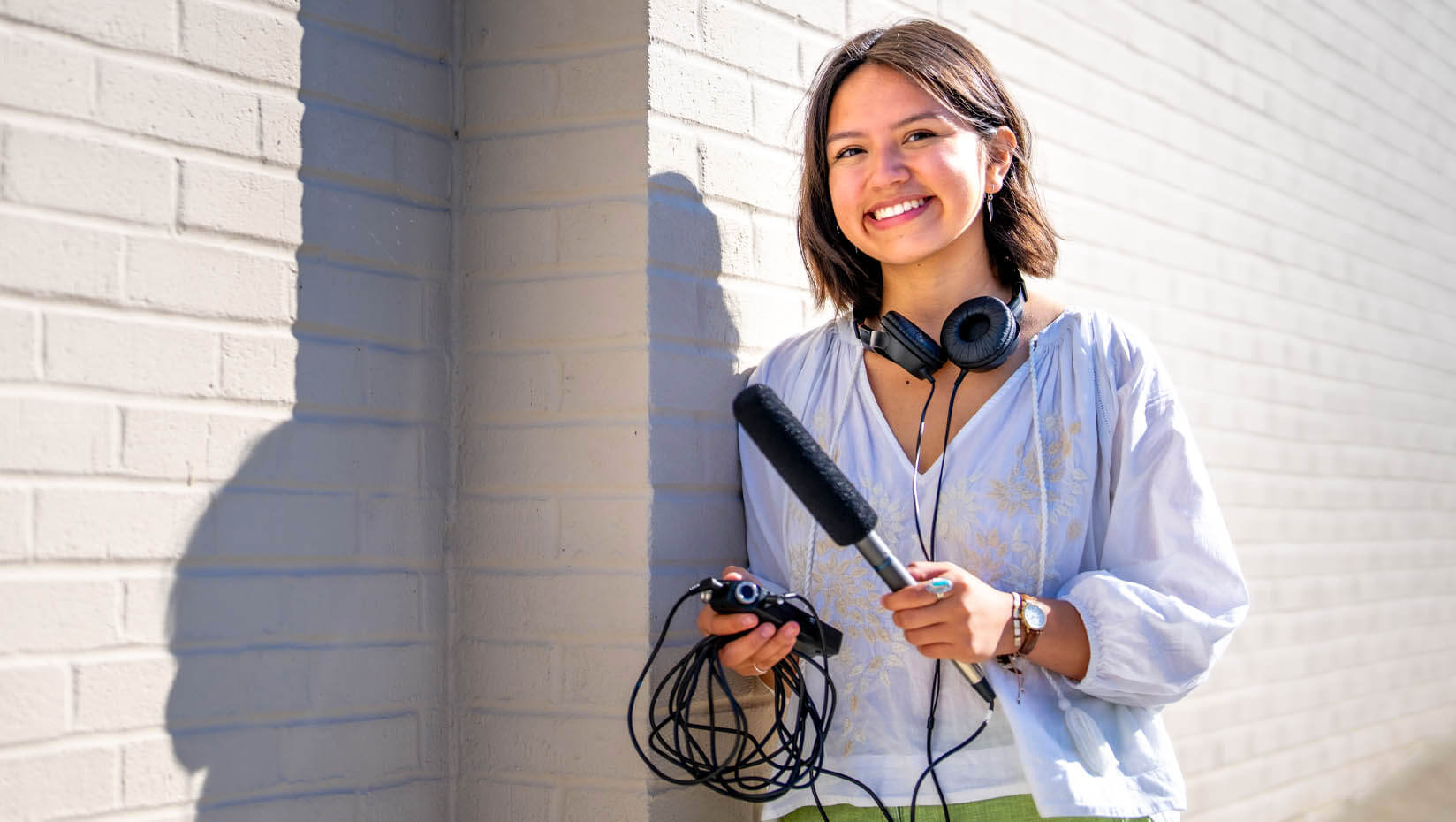
Caty DuDevoir: Bringing the student perspective to Maine Public radio
Caty DuDevoir uses her interest in human culture to create news stories that display the true history of Maine. Through her summer internship at Maine Public, the rising senior at the University of Maine majoring in anthropology with a journalism minor has been able to amplify overlooked voices and perspectives, like she also does with her on-campus activism.
Born in Mexico, DuDevoir and her family moved to Biddeford, Maine, when she was entering preschool. She developed a passion for writing and got her first opportunity to be published in high school, when she participated in a journalism workshop with Maine Public about incorporating climate change into school curricula.
This summer, DuDevoir received the Jim Dowe Internship to work for 10 weeks at the offices of Maine Public in Lewiston and Portland. This internship, created in the memory of former Maine Public President and CEO and UMaine alumnus Jim Dowe, is given to a student who displays a passion for the people of Maine and a commitment to public service.
As an intern at the office, she experiences flexibility in her reporting, striking a balance between being given leads by her superiors and pitching ideas of her own.
“The way they give feedback is really encouraging; I never feel discouraged about anything,” says DuDevoir. “I’m working with these brilliant people that make me want to show up everyday and produce the best quality piece that I can. I honestly haven’t felt like an intern. They put a lot of trust in me.”
DuDevoir pitched and produced her own piece for Maine Calling, one of Maine Public’s featured radio programs, titled “Archaeology provides insights into Maine’s past, present, and future.” The episode discussed archaeology in Maine through an indigenous lens. DuDevoir noticed a similar episode on this topic aired in 2013, but it lacked involvement from Indigenous community members. Having a background in anthropology, DuDevoir’s understanding of human history and culture made her the perfect candidate to reassess this story.
“At UMaine, there is an emphasis on considering the perspective of the Indigenous groups that you’re working with and I think I’ve hopefully carried that through,” says DuDevoir. “You have to build relationships with people. You’re not just saying, ‘Hey, I need to write this story, please give me a quote.’ You’re sustaining something more meaningful, and I definitely learned that within the anthropology department.”
In DuDevoir’s piece, she collaborated with Bonnie Newsom, UMaine assistant professor of anthropology and member of the Penobscot Nation, and Isaac St. John, tribal historic preservation officer for the Houlton Band of Maliseet Indians. DuDevoir met Newsom while attending the Maine Archaeology Field School that she ran in the summer of 2022, where Newsom also introduced DuDevoir to St. John. On the show, Newsom and St. John discuss how archaeology was once an incredibly exploitative field in regard to Indigenous peoples, but it is finally recognizing the importance of including these vital voices.
“Caty is a thoughtful and ambitious student and her performance as an archaeology field school student was exemplary,” says Newsom. “I am particularly impressed with Caty’s cheerful disposition and enthusiasm. With her scholarship, she brings a real positive energy to her work with diverse colleagues.”
Beyond her journalism work, DuDevoir, who is also in the Honors College, has dedicated much of her time at UMaine to amplifying unheard voices. She was a part of the student activism group Divest UMS, which encouraged members to petition the university against investing money into the fossil fuel industry. She has written for Maine EPSCoR and continues to write for the Maine Campus, where she will serve as editor-in-chief during her senior year. DuDevoir says she uses those platforms to share important information about medical and scientific research as well as political news relevant to local Mainers.
Juggling college, extracurricular writing and activism is not an easy task. DuDevoir believes it is challenges like these, however, that show the true potential of a prospective journalist.
“You have to be hardworking in the journalism field,” says DuDevoir. “To work for Maine Public, a very respected journalism company, I needed to have those credentials to show them, ‘Hey I can write, I can meet a deadline, I can produce.’”
This school year, DuDevoir aspires to take the skills she’s learned at Maine Public and share them with other student writers on campus.
“The journalists at Maine Public are these amazingly talented people. Interning with them has developed my confidence as well as concrete skills like interviewing and writing,” says DuDevoir. “I want to give that back to where I started.”
After finishing her final year at UMaine, DuDevoir hopes to pursue a career in the journalism field (she notes interest in working with Maine Public again). Even as she gains traction as a writer, however, she still holds passion for anthropology. Although she will spend most of the next few years developing her journalistic skills, she aspires to one day shift her focus to earning a doctoral degree in cultural anthropology.
“One of the things I’ve heard a lot from reporters I’ve worked with is you need to develop a strong skill set. Especially nowadays, being a multimedia journalist is important,” says DuDevoir. “This internship has really broadened my skills, but I still have so much to learn.”
This story was written by Erin Cabral, 2023 summer intern at the UMaine Division of Marketing at Communications.
Contact: Marcus Wolf, 207.581.3721; marcus.wolf@maine.edu
